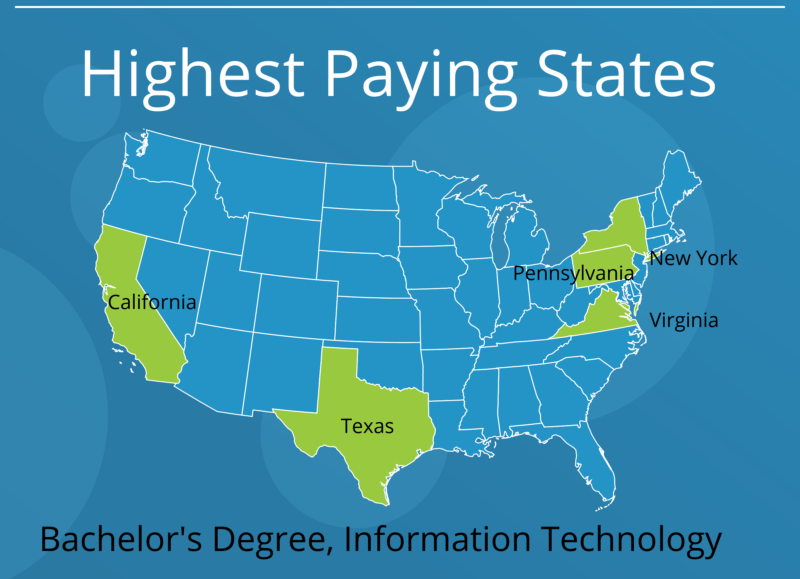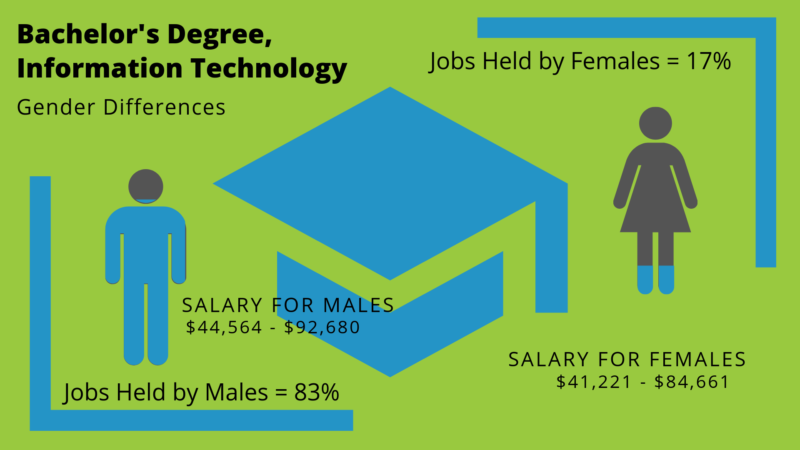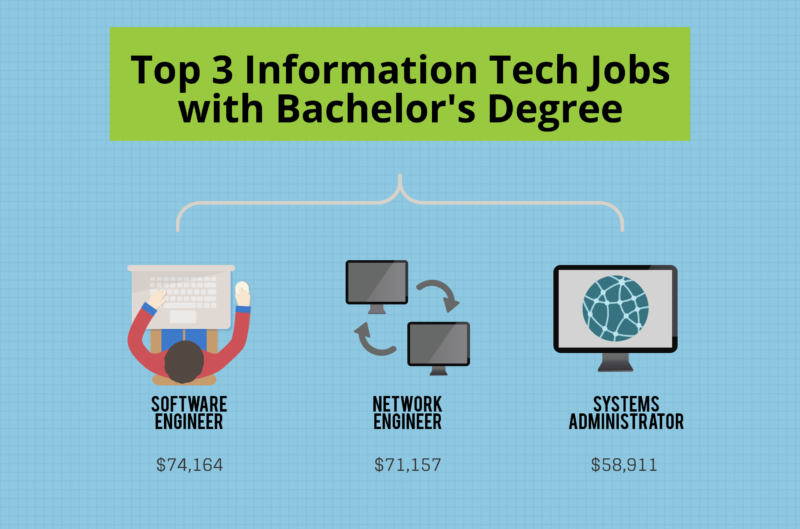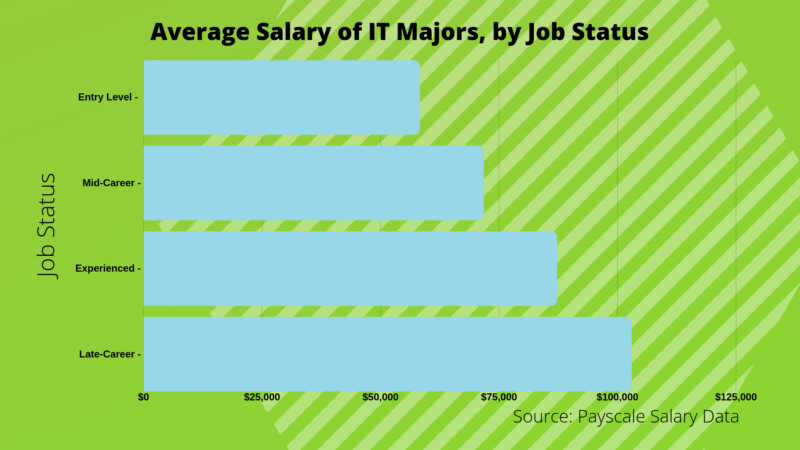An information technology degree prepares students for the many ways in which computer systems use software, hardware, and networks to manage (and secure) the transmission and storage of information and graphics across the world. Many consider the Information Technology industry to be the next exciting frontier to explore. IT is fascinating work and offers many career options for technology professionals. The Information Technology industry is expected to outpace the general economy in terms of job growth in the next few years.
So, for those who have asked themselves — Is an Information Technology degree worth it? — The answer is a definitive yes!
Read on to learn what an Information Technology degree will do for you.
Related:
- Best Bachelor’s in Information Technology Degree Programs
- Best Online Information Technology Degree Bachelor’s Programs
- Fastest Online Information Technology Degree Bachelor’s Programs
- Most Affordable Online Information Technology Degree Bachelor Programs
Accreditation for Information Technology Programs
There are many factors that determine which school will provide the best program for any one student. Most degree seekers first determine if one of the school they have selected has been accredited by an officially-recognized accrediting agency.
School accreditation is a significant component of any degree or program; however, it is especially important in the complex field of Information Technology — one of the fastest evolving industries at presents As such, a school’s overall accreditation and specific information technology accreditation is critical to know. Before submitting an application to a school, be certain that the school’s accreditations meet the requirements of future employers. The reality is many Information-Technology employers insist that an applicant’s degree is from an accredited school.

Regional Accreditation
The United States Department of Education is ultimately responsible for recognizing reputable schools within the United States. To do so, the US Department of Education has set up six regions, each of which is overseen by an independent accrediting body recognized by the federal government. Regional accreditation (despite the misleading name) is a nationally-recognized accreditation considered the standard for educational quality. A school that operates without regional accreditation will not likely be considered valid in the eyes of future employers.
Information Technology-Specific Accreditation
Accreditation is a perplexing topic when one considers the many acronyms to learn when researching the available programs. The primary accreditation agency for the Information Technology industry is the Accreditation Board for Engineering & Technology — ABET.
Since 1932, ABET accreditation requirements have reached most corners of the globe. Every year, more than 100,000 students earn their degree from ABET-accredited online schools — located in more than 30 countries and offered by nearly 800 universities/colleges.
What is ABET accreditation?
ABET — the Accreditation Board for Engineering & Technology, is a non-governmental oversight agency tasked with determining if a post-secondary information technology program meets established criteria in the fields of natural science, computer science, engineering, applied science, and engineering. ABET accreditation is the industry-accepted way to assure future students that the school they have chosen meets the education standards demanded by the information technology industry.
Schools offering online Information Technology degree programs — who meet ABET’s accreditation requirements — Become ABET-accredited online schools. The ability to publicize information technology undergraduate programs offered as ABET-accredited online school is one of the ABET accreditation advantages.
The Association to Advance Collegiate Schools of Business (AACSB)
The Association to Advance Collegiate Schools of Business (AACSB) was founded in 1916 by seventeen colleges/universities to accredit business schools in the United States. By the end of the 20th Century, AACSB-accredited schools could be found in many other countries. Recently, the AACSB has set their sights on approval from the International Organization for Standardization (ISO).
Types of Information Technology Degrees
Are you a tech whiz?
Have you recently asked yourself — Are there any IT programs near me? Or, are there any quality IT programs online?
The answers are likely, and yes.

Information Technology professionals are employed across nearly all sectors of the economy. Their responsibilities are quite diverse. Students interested in earning their Bachelors in Information Technology (IT) degree, graduate with an impressive selection of job opportunities.
When students begin to explore their many career options as an IT professional, it is important to differentiate the baccalaureate degree options. The majority of IT programs offer a Bachelor of Science in Information Technology degree, a BA in Information Technology, or some minor variation thereof.
In addition to the various Bachelor’s in Information Technology degrees offered, a Bachelor of Science in Information Technology can very often be earned as an online IT degree. Online information technology degree programs offer flexible scheduling, which is a must for working learners who are pressed for time. An online IT degree is a quality degree offered from prestigious university’s specialty programs. Students should gather information along the way to a final decision. This includes:
- Bachelor of Information Technology syllabus
- Information Science and Technology degree programs
- Information Technology course subjects
- Information Technology degree requirements
- Information Technology major subjects
- Online Information Technology courses
A quick online search reveals:
- The top-ranked Information Technology schools
- The available accredited Information Technology programs
- The best Information Technology degrees
- The best IT associates degree online
- An accelerated Information Technology degree online program option
- An affordable online Information Technology degree program
- A cheap online Information Technology degree program
- The available data regarding Information Technology online schools
Information Technology degree online programs differ from one program to another, so it is important to understand each program’s specific Information Technology degree requirements by reviewing the school’s Bachelor of Information Technology syllabus.
Bachelors in Information Technology Degrees
A Bachelor of Arts degree — a BA in Information Technology — typically requires four years to complete, but accelerated programs can take less than two. This holds true whether a student studies on-campus or studies for an Information Technology degree online. Students traversing the Bachelor of Science in Information Technology pathway will explore the fundamentals of information technology during the first two years. Information Technology course subjects include:
- Computer Networks
- Computer-Based Systems
- Database Management
- Information Technology Project Management
The Various Types of Information Technology Degrees
The of Information Security field offers many degree variations. Programs differ and are based on the school’s specific approach or subspecialty program. These information technology programs are offered by professional schools and top-ranked Information Technology schools with professional studies programs. Information Technology programs are offered as an IT Associates degree online, a Bachelor in Information Technology degree, as well as graduate and doctoral degrees.
Students can select an Information Technology degree online program that offers a specialized approach to the degree. A few examples are listed below:
- Certifications/Licenses in Information Technology
- Communications
- Cyber Security
- Data Mining
- E‑commerce Technology
- Graphic Design
- Healthcare
- Human/Computer Interaction
- SEO Solutions
- Software Engineering
- Web Development
- Wireless Networks
The type of Information Technology chosen will dictate the exact Information Technology course subjects and the Information Technology major subjects.
_________________
So, are you still asking yourself — Are there any IT programs near me? Are you still wondering if there are quality IT programs online? Of course, there are. Some of the most easily accessible Information Technology online schools are at your fingertips as you read this narrative.
Sign on to find an online IT degree that meets your education and career objectives. Most online Information Technology degree programs allow students to apply online. Many information-technology programs offer a chance for a student to complete an online application at no charge.
Certifications/Licenses in Information Technology
The majority of the businesses and sectors that define the economy depend upon the skills and talents of IT professionals in the Information Technology industry. Some individuals might find it difficult to fathom just how vital a role Information Technology professionals play in the modern economy, but the reality is, information technology professionals are hugely important to most industries in the economy. The economy’s growing dependence on the information technology professional is the primary reason the Bureau of Labor Statistics (BLS) predicts an above-average growth (13%) through the year 2026. The Bureau of Labor Statistics notes that the strongest growth will be in the Information Technology subspecialties of Information Security, Data Storage, and Cloud Applications.
Information Technology specialists support most industries and government agencies by applying technical solutions using software, hardware, networks, or Internet applications. Those interested in pursuing a career as an Information technology professional will find many ways to earn a degree and many degree levels to reach for.
An Information Technology professional generally begins their path to their IT career with an associate’s degree or bachelor’s degree in Information Technology. However, it is noted that there are many certificate courses in the IT industry that can be earned as a stand-alone achievement or as an additional education accomplishment that complements an undergraduate degree.

Certifications in Information Technology
A certificate program offers specialized information technology coursework. An Information Technology certificate course typically takes between 6 months and 1 year to complete. Students follow a concentrated focus within a specific area. Information Technology certifications are the perfect solution for those who want to specialize in an IT skill or expand their knowledge of a specific IT subject.
Specialist Certification Options
There are a variety of Information-Technology certification programs from which industry professionals can select. A few examples of these available Information Technology certifications are listed below:
A Computer Programmer
Computer programmers are tasked with the responsibility of writing (and testing) computer code. Computer code dictates how computer systems and applications will operate within their digital environment. A computer programmer’s objective is to make sure that the program meets its intended application. Computer programmers generally work independently and, often work from home. Computer programming Information Technology certification programs cover the programming languages of JAVA, C++, and Visual Basic.
A Computer Network Architect
A Computer Network Architect specializes in creating and implementing communication networks for businesses, organizations, and agencies. Their talents effectively manage the storage and transmission of data across WANs — Wide Area Networks. Additionally, they manage data functions on Cloud Infrastructures, Local Area Networks (LANs), or a combination of network types. A Network Architect must work closely with data security specialists to design a protective data environment/network. Information Technology certification programs are generally offered by technology companies, so they ensure the end user is adept at navigating the computer network safely.
A Computer & Information Research Scientist
An Information Computer Research Scientist specializes in the improvement of current computer technologies. In addition, Information Research Scientists solve complicated Information Technology problems by designing brand-new cutting-edge technologies to address specific industry issues. These complex problems require a solid knowledge of algorithms, the tools which permit Information Research Scientists to discover efficient computing technologies. Their research tools include robotics, programming, and data mining, among others. Institutions of higher learning often employ computer network architects. Information Technology certifications in this specialty depend on the industry.
A Computer Support Specialist
A computer support specialist has received advanced training regarding the customer-centric area of information technology. Some support specialists work within specialized call centers helping end users all over the world. Still, other support specialists travel across the country (and the world) to solve technology issues on-site, at various client locales. A Computer Support Specialist often facilitates communication between IT professionals and non-IT professionals. Most support specialists fine-tune their abilities by completing a certificate course regarding the product they support.
Database Administrators
A database administrator is tasked with the design and oversight of a database. In general, database administrators are responsible for the safe transmission and storage of big data. Additionally, database administrators design testing structures to offer transparency as to the performance of the database. The product manufacturers generally mandate certification programs.
Popular Beginner Information Technology Certifications
Noted below is a partial list of popular Information Technology Certifications for industry professionals:
- CCDA: A Cisco-Certified Design Associate
- CCNP Routing and Switching
- CISA: A Certified Information Systems Auditor
- CISM: A Certified Information Security Manager
- Certified Ethical Hacker (CEH)
In general, the more advanced, higher-paying information technology positions require the IT professional to complete a variety of certificate programs.
Careers in Information Technology
Moving on, the next logical question should be “What are some entry-level Information Technology jobs?” The narrative that follows offers helpful guidance regarding available entry-level Information Technology jobs in today’s job market.
The computer, in one fashion or another, is used in the management of government agencies, organizations, businesses, and, of course, people’s personal lives. Computers are an integral part of modern society — and they are here to stay.
The Computer Industry, which includes Information Technology professionals, is poised to take advantage of the industry/economic pundits’ interpretation of powerful indicators that suggest the technology/computing sector will experience a strong growth period over the next decade. The result of this persistent growth is great news for those looking for entry-level Information Technology jobs for recent graduates. An IT professional will find a wide-open job market in the near future, which just might be likely to be longer than that.
As a result, an Information Technology specialist can expect to find a need for their specialty services to remain high. Remember, nearly all-economic sectors have grown dependent on computer applications to manage their business.
Most entry-level Information Technology jobs require the job applicant to possess a baccalaureate degree prior to working. Some Bachelor of Information Technology jobs may require the IT professional to earn additional IT certificates as one advances through their career. It is noted that there are limited amounts of entry-level tech jobs no degree available in the marketplace, but, their availability is scarce. The same would be true for entry-level tech jobs no experience.
Because the computer industry impacts most, if not all, economic sectors, there are many entry-level IT job titles to choose from — they can be found in federal or state agencies, nonprofit organizations, and high-tech international businesses.
An Information Technology professional who has earned a bachelor’s degree will find more advanced entry-level information tech jobs than someone searching for entry-level tech jobs no experience required.
Check out some Bachelor of Information Technology jobs listed below. Note: This is a partial list.
Computer Programmer — writes and test computer code to ensure the program or application delivers its intended purpose
Database Administrator — responsible for the management, storage, and transmission of data
Network Administrator — responsible for the daily tasks of computer systems management
Security Analyst — responsible for protecting the computer or network, and keeping pace with digital threats and risks
Software Developer — typically the creative force behind videogames
Systems Analyst –responsible for managing a computer system by increasing its efficiency

Information Technology Degree Salary Expectations
Just a few decades ago, computer techies had the imagination and foresight to realize just how impactful the computer would be on everyday life. And, as recent history has taught us, they couldn’t have been more right. The technology industry is tasked with making life easier by automating repetitive or difficult tasks. And, in making that happen, computer professionals had no choice but to create an intricate, complex, electronic environment that is seriously difficult for many to understand. This is one example of why Information Technology professionals can look forward to job security in the future.
With little room to argue, the world has become seriously dependent upon the computer’s power. The world’s population is unlikely to give it their dependence on it. This is great news for the Information Technology industry, and only improves the career outlook for Information Technology professionals. Strong demand for IT professionals will, if you follow the principles of supply and demand, push the IT professionals’ salaries in an upward direction.
According to federal government statistics, the Bachelor’s in Information Technology salary is anticipated to grow at a rate of 13% through 2026 — faster than the general economy’s anticipated growth. So, what can you expect a BS Information salary to be?
As logic would dictate, the entry-level Information Technology jobs salary is at the lower end of the salary scale. However, the entry-level Information Technology jobs salary is still considered a respectable salary by most. An IT degree salary will increase as you gain experience and additional education through advanced studies and certificate courses.
Information Technology Career Salary Statistics
According to the federal government’s Bureau of Labor Statistics (BLS), Computer and Information Technology jobs had an annual salary of more than $84,000 (May 2017). The Information Technology median salary was more than twice the median salary of all US jobs combined ($37,690).
In addition, the US Department of Labor estimates that from 2016 to the year 2026, there will be more than one-half million new jobs created. The following IT specialties will likely see the strongest growth and a more elevated Information Technology degree salary:
- Cloud Computing
- Database Management
- Information Security
An Information Technology career salary varies and depends upon several factors. Most who know agree that a job applicant’s education is one of the primary factors that determine just how high an IT degree salary will go. A Bachelor’s in Information Technology salary offers most entry-level workers an opportunity to get their foot in the door to the IT field, where the potential for growth is strong. A BS Information Technology salary is a smart educational springboard that propels information technology professionals to a position of management or leadership.
Information Technology Professional Associations and Organizations
Every field and business sector has one (or many) professional organizations devoted to supporting the professionals who work in the industry and, to improving the overall industry, whenever possible. Information Technology professional associations provide a wide variety of benefits to working IT professionals who are members.
There are information technology professional associations supporting the IT industry and its working professionals. These information technology professional organizations are often created to meet specific industry needs. They include:
Association of Information Technology Professionals (AITP) is considered the information technology association of America, and the world. The Association of Information Technology Professionals is international in its scope; as it helps information technology professionals advance their careers, which furthers them near their professional objectives across the world. Members of the Association of Information Technology Professionals will discover how information technology professional associations are truly great resources for industry professionals. They allow IT professionals to effectively network and search for additional career opportunities.
CompTIA— The Information Technology Association of America (ITAA) is an industry-leading trade group composed of computer science professional organizations. CompTIA operates as a nonprofit computer science professional organizations.
Data Management Association International (DAMA) — DAMA is one of the information technology professional organizations whose mission is to find viable ways to help industry professionals advance their studies and careers. DAMA organizes and manages a network of local DAMA chapters where members can attend professional lectures and IT-related workshops. Additionally, the Data Management Association International provides a specific industry designation to its members: CDMP — The Certified Data Management Professional.
